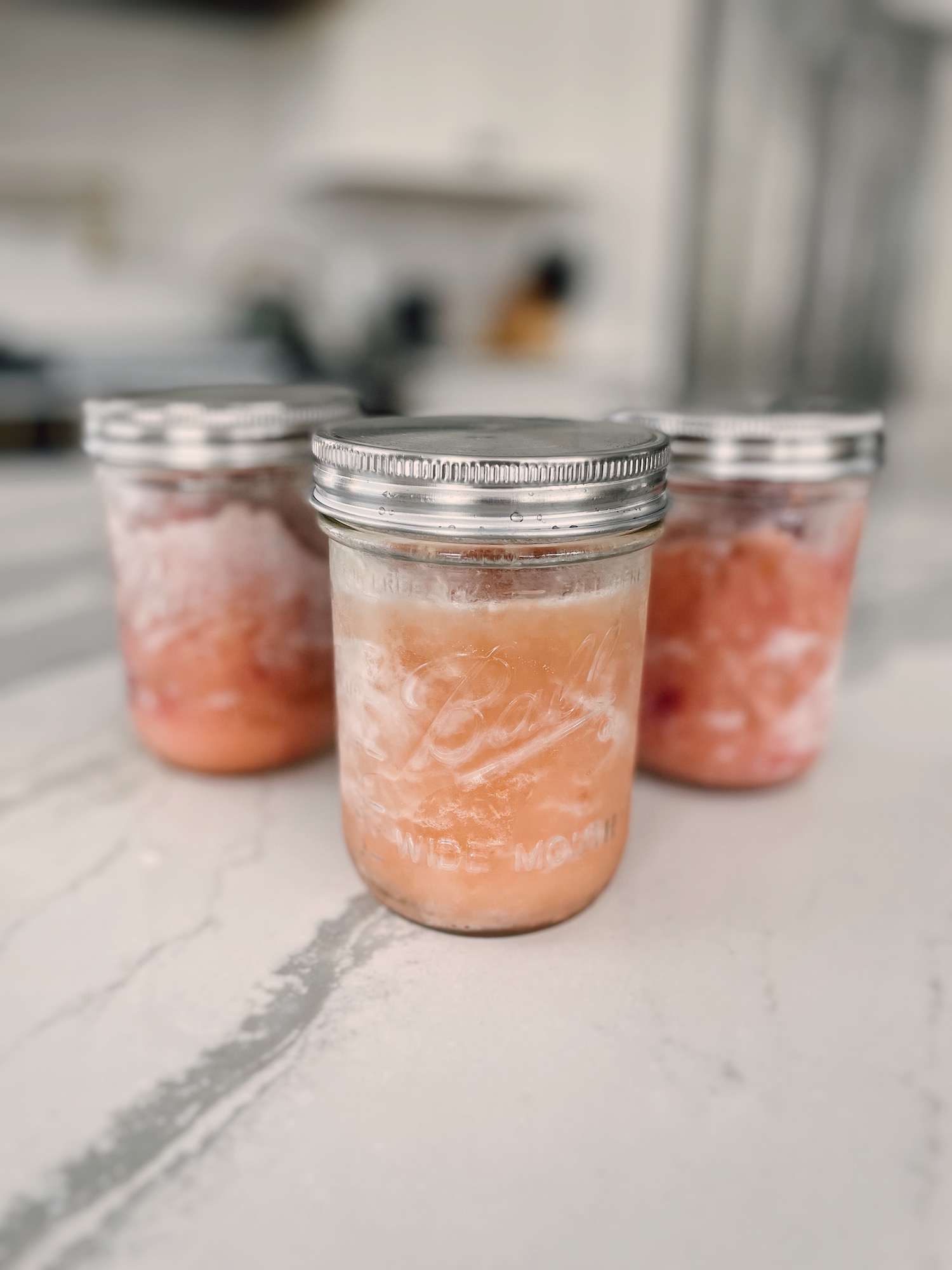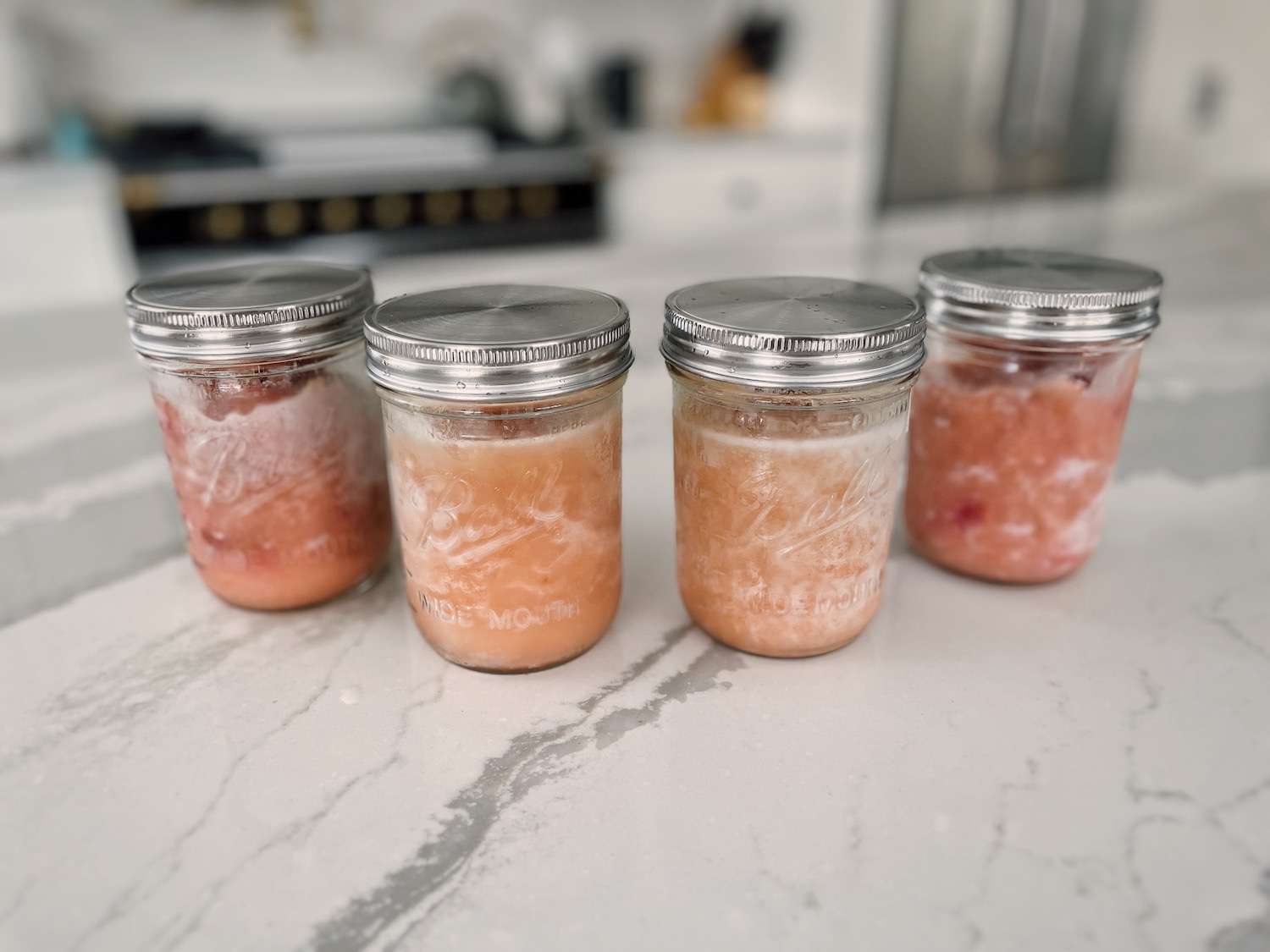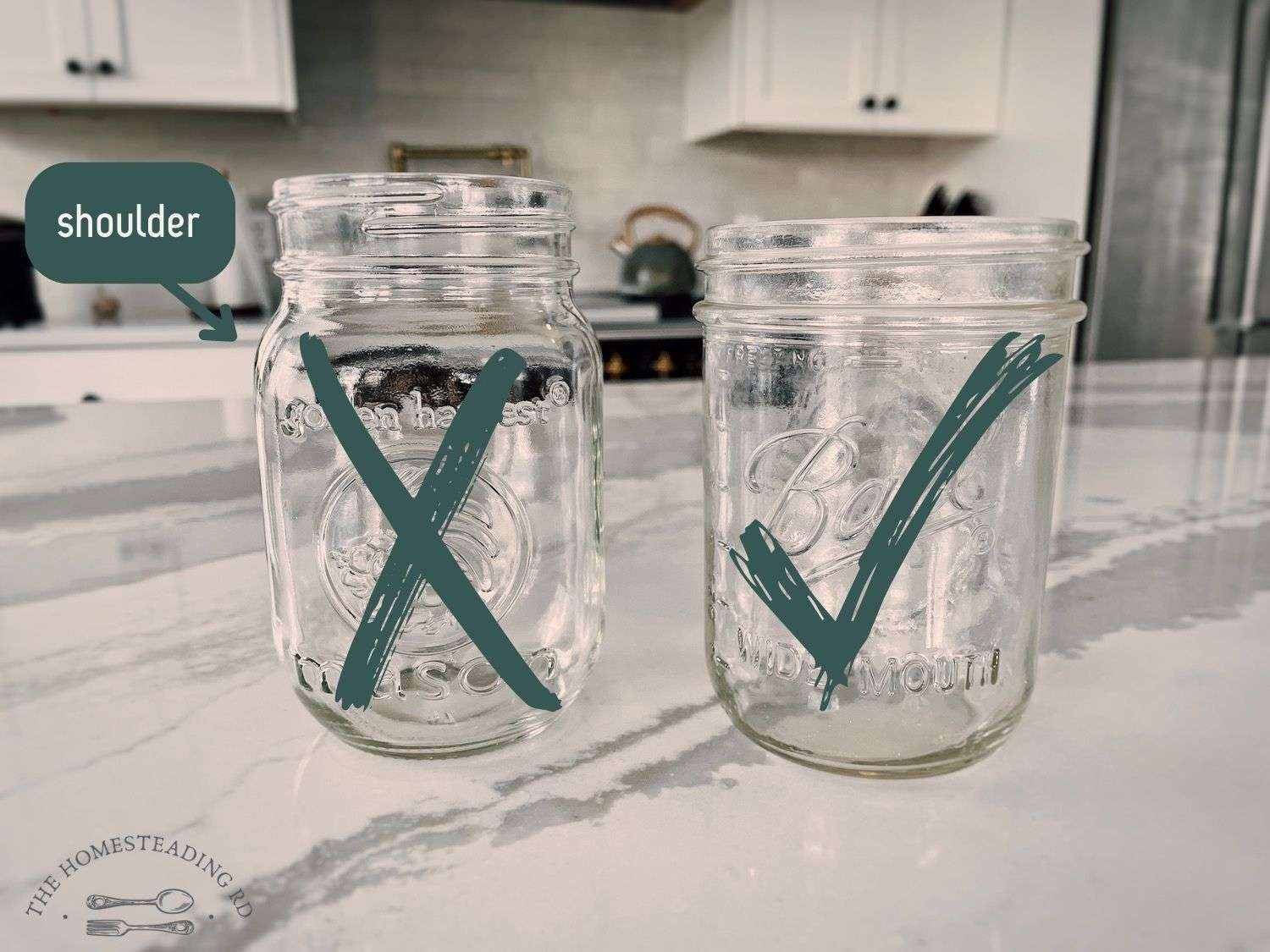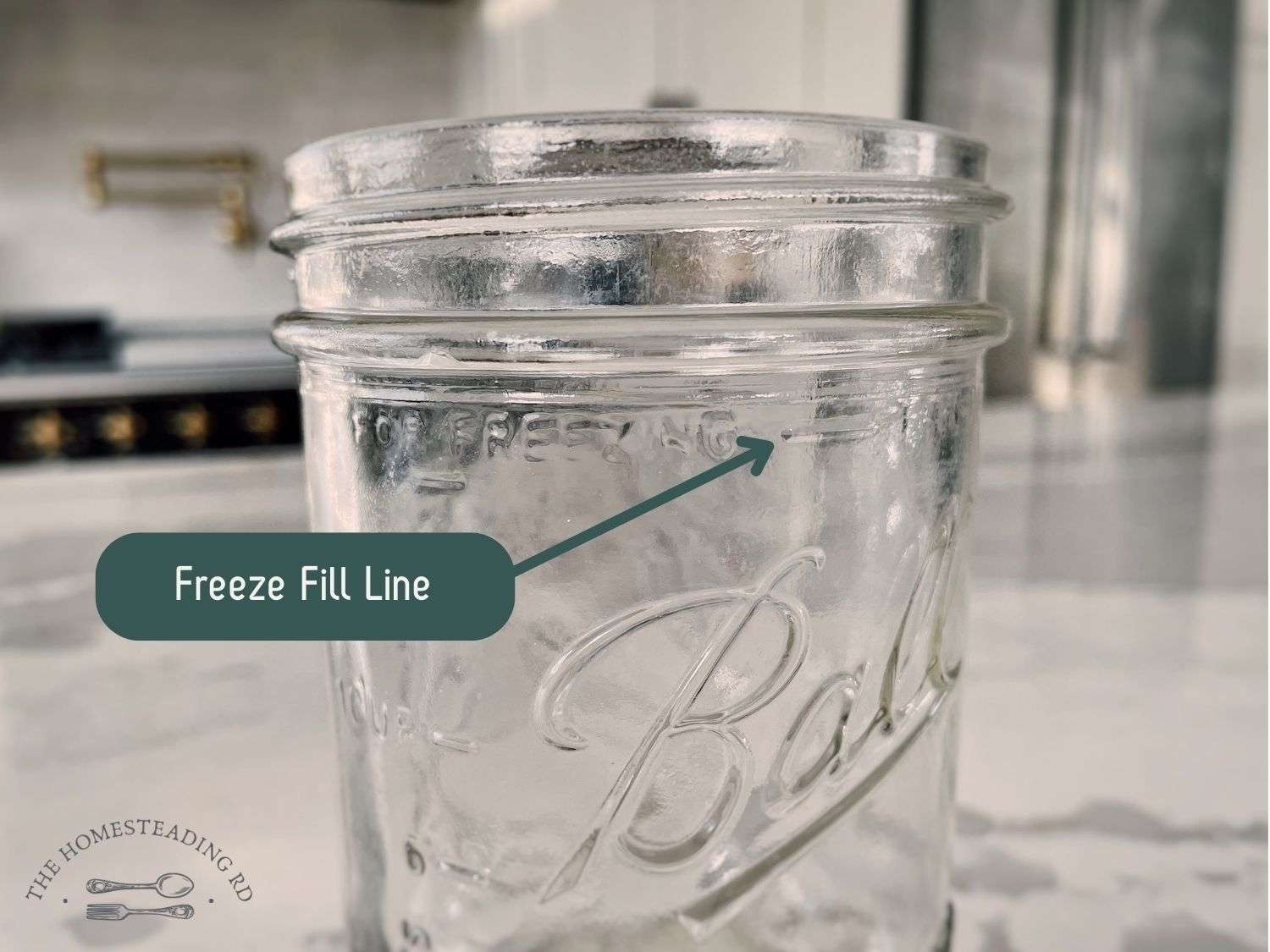Freezing is one of the easiest food preservation methods out there, but can you freeze mason jars? The short answer is absolutely you can!
However, there are some essential steps that you need to take to prevent complications such as jars shattering or rusty lids. In this article, we’ll chat about the right way to freeze mason jars and the 7 most common mistakes to avoid.
Let’s jump in!
*Disclosure: This post may contain affiliate links to products (including Amazon). I’ll earn a small commission if you make a purchase through my link, at no additional cost to you! Regardless, I only link to products that I personally use on our homestead or believe in.
Can You Freeze Mason Jars Filled With Food?
Let’s just cut to the chase and answer your burning question right away!
Answer: Yes!
However, the answer is rarely ever this simple, right? It’s a bit more complicated than just slapping your leftovers in any old jar and throwing it in the freezer with a standard lid. Keep reading to learn the best way to go about it!
Why you should freeze food in mason jars
I utilize pretty much every method of food preservation out there (canning, fermenting, dehydrating, vacuum sealing, pickling, you name it!), but often I still resort to the simple method of freezing in mason jars! Here’s why:
Easy
Compared to the other food preservation methods, this is the easiest method. Simply fill the correct jar (using proper methods), add the correct lid, and into the freezer it goes!
Limited equipment needed & inexpensive
This is the biggest positive when it comes to freezing in mason jars. Most methods of food preservation require large, expensive equipment (dehydrators, vacuum sealers, and pressure canners, to name a few).
When freezing mason jars, you only need a wide-mouth mason jar (which most people have on hand anyway!) and a proper lid. That’s it! Of course, there are extra tools to make the process even easier, but those 2 items are all that are necessary.
Toxin-free & sustainable
This is a HUGE plus for freezing in mason jars! While vacuum seal bags are excellent for getting all of the air out (no more freezer burn!), the plastic can still be a concern. Glass is a toxin-free material and something that I trust touching my food.
The other positive of glass mason jars is that they are reusable! Simply wash and refill, over and over again.
Reduce food waste
- Have an extra cup of soup left over from dinner? Freeze it instead of tossing it out! I love having extra leftovers in the freezer that I can uilize when I’m in a rush.
- Have an extra leftover smoothie from the big batch you made? Freeze it and enjoy it later!
- What about the big batch of homestead refried beans? Definitely freeze the extras to pull out the next time you have taco night.
- Did a few jars not seal properly when canning? Pop them in the freezer instead of rushing to consume them within a week.
Tools for Freezing in Mason Jars
As I mentioned above, you really don’t need much when it comes to freezing in mason jars! However, it is important that you’re using the right jars and lids.
Wide-Mouth Jars
Yes, you have to use wide-mouth jars. That’s because the jar contents expand as they freeze. Regular mouth jars have a “shoulder,” which creates a high-pressure point and can result in the jar shattering as the contents expand.
The Homesteading RD's Product Picks: | |
Don't cheap out on your mason jars! Go for a quality brand like Ball that is made to last. Features a helpful "fill line" for freezing! Made in the USA and features heat-tempered durability. Comes in a 5-pack or 10-pack to meet your needs. | |
Lids
While using the proper lid for freezing isn’t absolutely necessary, it can prevent a headache later. Condensation inside the jar can result in rust forming on your standard canning lids and rings. If there’s enough rust, they may become unusable or stuck!
I love these stainless steel lids because they are toxin-free rust proof and easy to use! They are also lined with silicone, rather than plastic like in standard canning lids.
The Homesteading RD's Product Picks: | |
Features 12 wide-mouth mason jar lids that are PERFECT for freezing! Made of rust-free & toxin-free stainless steel with a silicone lining. No plastic! Provides an air-tight seal and are build to last. | |
*Please note that these lids are not meant for canning and should only be used for dry storage or freezing.
Jar funnel
A jar funnel is useful for filling your wide-mouth jars without all the mess. If you don’t have one already, I highly recommend getting one! I use it every time I can or freeze my mason jars!
The Homesteading RD's Product Picks: | |
This is the perfect set for easily filling jars for canning or freezing without the mess! Features a wide-mouth and standard-mouth funnel, plus an umbrella strainer! Made of non-toxic stainless steel; much better than the plastic ones out there! | |
7 Common Mistakes When Freezing in Mason Jars
Yes, you can freeze mason jars, but there’s definitely a right way and a wrong way to do it! Let’s cover the 7 most common mistakes that people make.
Mistake #1: Using mason jars with a “shoulder”
Wide-mouth mason jars certainly are the way to go when freezing in mason jars. Contents expand as they freeze and if you’re using a standard-mouth jar, the “shoulder” may not be able to handle the pressure. No one wants to clean glass shards out of their freezer!
*If you are using quart or half-gallon mason jars, they are technically wide-mouth. However, they feature the “dreaded shoulder.” To adjust for this, keep the fill line 1″ below where the shoulder begins.
Mistake #2: Filling the mason jar with hot contents
Filling your room-temperature wide-mouth mason jars with hot contents can also result in the jars cracking. This can happen due to abrupt temperature changes. You have two options:
- Option 1: Let the hot contents cool before filling the jars
- Option 2: Warm up the jars first by filling them with hot tap water for a few minutes before filling them. You can also run them through the dishwasher and bring them out hot (my favorite option… if I think of it ahead of time!).
Mistake #3: Overfilling the mason jar
This is the biggest mistake that I see people make! The jar will shatter if it’s overfilled. That’s because the contents will expand as they freeze and if the jar is overfilled, there’s nowhere else for it to go.
So how full should you fill the jar before freezing?
- Most mason jars have a handy freeze-fill line that’s located just under the external ring. Keep your filling below this line and you should be fine!
- Don’t have a freeze-fill line? A general rule of thumb is to maintain 1” of head space when using wide-mouth jars.
- If using a mason jar with a “shoulder,” keep the contents at least 1″ below where the shoulder begins.
Mistake #4: Using standard canning lids
This is more of a guideline than a rule. You can certainly use your standard canning lids and bands (and I’ve done it!), however, they can rust over time. If there’s enough rust build-up, you may have trouble removing the lid and they may become unusable.
The best option when it comes to freezing and dry storage is stainless steel lids! These are incredibly sturdy, rust-proof, and honestly a less toxic option than standard canning lids. I love these!
The Homesteading RD's Product Picks: | |
Features 12 wide-mouth mason jar lids that are PERFECT for freezing! Made of rust-free & toxin-free stainless steel with a silicone lining. No plastic! Provides an air-tight seal and are build to last. | |
*Please note that these lids are not meant for canning and should only be used for dry storage or freezing.
Mistake #5: Freezing the mason jar with warm contents
We need the temperature of the jar contents to shift gradually to reduce the risk of the jar shattering in the freezer. Slow and steady wins the race here.
The best way to achieve a gradual transition is to move your freshly filled jar with room temperature contents to the fridge to cool all the way down before moving it into the freezer.
Mistake #6: Freezing with the lid on tight
This is the final step that can help prevent your jar from shattering. As the contents freeze and expand, that pressure can build up in the jar if the lid is screwed on tight.
Put the lid on as you place the mason jar in the freezer, but don’t screw it on all the way. Come back the next day once it’s completely frozen, and then screw it on tight.
Mistake #7: Forgetting to label
I am so guilty of this one! I always tell myself that I’ll remember… and then I don’t. Is that apple sauce, mashed potatoes, or schmaltz? Ugh. When it’s frozen, you can’t use the sniff test, either! Save yourself the headache by adding a label.
If you’re using my favorite reusable stainless steel lids, you’re not going to want to write directly on the lid. I like these dissolvable canning labels instead!
The Homesteading RD's Product Picks: | |
The perfect size labels for your canning jars, lids, salve tins, bags, envelopes, you name it! Features premium kraft paper to ensure the labels stick to different surfaces. I love the cute flower design, too! | |
FAQ About Freezing Mason Jars
Why do mason jars break in the freezer?
The most common reason why mason jars break in the freezer is because the contents expanded beyond what the jar could accommodate. This can happen due to overfilling the jar, freezing contents that are too warm, or screwing the lid on tight before the contents are completely frozen.
The second reason is due to using non-tempered glass. Non-tempered glass contains small air bubbles that can contract as the jar is frozen and expand as the contents are thawed. If this happens too rapidly, the jar can break. Stick with true canning jars that utilize tempered glass.
Can you freeze mason jars with metal lids?
You definitely can, but metal lids will quickly rust making them hard to get off and rendering them unusable for another time. I prefer stainless steel lids with a silicone seal for freezing mason jars.
Can you freeze mason jars with liquid?
Absolutely! In fact, that’s the majority of what I choose to freeze in my mason jars. I’ve done everything from applesauce and schmaltz to smoothies and bone broth. Just make sure to leave enough headspace!
Can you freeze fruit in mason jars?
Yes, you can freeze whole fruit in mason jars. You can also freeze applesauce or smoothies as well.
Can you freeze mason jars with smoothies?
Definitely and this works really well. Pull out your smoothie the night before, place it in the fridge, and then it’ll be ready for you by breakfast! Just remember to leave enough headspace!
Can you defrost frozen food in mason jars?
For sure, but don’t rush it! Take the mason jar out of the freezer and place it in the fridge to slowly thaw out. Never microwave a frozen mason jar! If you’re really in a rush, take of the lid and place the jar in a bowl of warm water.
Are there negatives to freezing in mason jars?
While freezing mason jars is super simple to do, there are a few negatives. The first is that your food might experience some freezer burn since there is a decent amount of oxygen exposure in the top 1″ of the jar. Another negative is that the jars take quite a while to thaw out compared to flat freezer bags.
Other Articles You’ll Love
- Principles for Food Preservation
- Jalapeno Pickled Eggs (No Canning Necessary!)
- How to Make Dehydrated Carrots (EASY!)
Final Thoughts
Can you freeze in mason jars? I hope by now you know that the answer is yes, yes, yes! It’s easy, inexpensive, and requires minimal equipment beyond using the right jars and the right lids. Enjoy!











On Amazon it says the stainless steel lids recommended here are not for canning, but Katie recommends them for freezing in Mason Jars. Why not use the lids for canning, else what’s the point in having a seal?
Is there a significant difference between canning and freezing, regarding the lids?
That is correct – these stainless steel lids are only to be used for freezing, storing items in the fridge, or for dry goods. For water bath or pressure canning, you’ll need to use lids meant for canning. You can certainly still use the traditional canning lids and bands for freezing as well, but they can corrode overtime.
This answered all of my questions on freezing in mason jars!!! Thank you thank you!!!
Hooray! I’m so glad to hear it 🙂
If you haven’t yet purchased the lids for freezing that you suggest but need to freeze some liquids, is it possible that wax paper, Saran Wrap, or something easily purchased like that be used inside the regular canning lids? Loved your article, thank you!
Thank you! This is immensely helpful. I’m going to be out of town next week and forgot about that when I bought groceries for juicing. I have quart mason jars and want to freeze the fresh juice but didn’t know how much space to leave. This is the perfect post to answer all of my questions. Thanks again.
I’m so glad to hear that it was helpful! 🙂
Thank you so much for this post! I have been trying to utilize Mason jars in the freezer but have had several shatter! I thought I fixed the problem by watching a YT video only to have another jar shatter. Your post diagnosed and addressed my problem, Regular mouth jars!
Now I know how to fix this. Thanks again. I heard your guest podcast on Simple Living Made Simple and came over to check your blog out. I am eager to look around and try some of your DIYs as a new homesteader.
So sorry to hear that you’ve been having trouble with the jars, but glad to hear that my article helped diagnose the issue! 🙂 Thanks for being here!
I should have looked this up before finding my 4 quart jars of homemade stock cracked in the freezer, wah! But thankful to have found it now 🙂
Shoot!!! Well, at least you know now for next time 🙂
Do they make larger lids ?
These are wide mouth lids, how large are you thinking?
Question: Half gallon jars are wide mouth, but have the lip. Can I use them to freeze my pomegranate juice? Thanks
Great question! You can use the half-gallon jars, but they have the “dreaded shoulder” just like standard-mouth mason jars. You can account for this by making sure that you leave a 1″ gap between the shoulder and your pomegranate fill line
It’s really helpful to read this post as I’m also wary of using glass in the freezer, but also, I’m really not keen on all the plastic packaging.
Freezing in mason jars is pretty risk-free as long as you follow my steps! Good luck 🙂
Wow where has this article been all my life LOL! I’ve always thought about freezing things in mason jars and glass but just had this feeling that it would go sideways. I could never put my finger on it but you’ve confirmed my suspicions and I can’t wait to finally start using jars to freeze stuff!
So glad this was helpful to you! Freezing in mason jars is totally doable with a few simple steps 🙂 Enjoy!
I’ve lost count of how many jars have been broken in my freezer. Thanks for this informative article!!!
Hopefully you won’t have a broken jar ever again with my tips! 🙂
I needed to read this! We’re just getting ready to freeze some jars of food!
Perfect timing!
We lost a couple half gallon jars due to over filling! This is a great article! Thank you!
Shoot! I hate that when that happens 🙁 Hopefully that’s the last of jars breaking for you now!
Would never think to freeze food in a mason jar due to fear of them eventually breaking from the expansion of its content. Thanks for explaining that the type of mason jar used makes a difference. I will definitely be testing this theory.
With a few careful steps, it can certainly be done successfully 🙂
Great advice! Especially the tip about using the right shape jar. I had no idea that was a factor when freezing.
The jar definitely plays a role – stick with the wide mouth and you should be good to go!
Such helpful info, thanks! Could you use standard mouth jars if you fill to 1 in below the start of the neck?
Yes, you could. The jar would only be about half-full at that point, though, and would waste a lot of space!
Really great and informative post on freezing mason jars. Although I’ve never attempted this at my home, it’s really great information on the proper ways both pros and cons. Thank you for sharing!
Excellent! You’ll be ready to give it a try should the situation arise 🙂
I am guilty of a few of these and use mason jars all the time for freezing. Oops! I will be sure to use wide mouth and not close it tightly. Good tips.
I’m glad you found it helpful! Those few extra steps really make sure that it freezes properly without complication.